Are you curious about what a Cornish game hen is and how to prepare it? At polarservicecenter.net, we understand the importance of clear, concise information. In this guide, we will explore everything you need to know about Cornish hens, from their origins and characteristics to the best cooking methods. Discover how to make the most of these delicious birds, ensuring a delightful culinary experience. Explore our site for related topics like troubleshooting your Polar fitness tracker while you cook, or find warranty information if your kitchen timer fails.
1. What Exactly Is a Cornish Game Hen?
A Cornish game hen is a small breed of chicken, typically weighing between one and two pounds. Cornish hens are valued for their tender meat and mild flavor. Here’s a detailed breakdown:
- Definition: A Cornish game hen is a crossbreed between a Cornish chicken and another breed, often a White Plymouth Rock.
- Size and Weight: Typically, a Cornish hen weighs between 1 to 2.5 pounds, making it a perfect single-serving portion.
- Flavor Profile: Cornish hens have a delicate, slightly gamey flavor that sets them apart from regular chicken.
- Age: These hens are young, usually around 4 to 6 weeks old when processed.
1.1. Cornish Hen vs. Chicken: What’s the Difference?
What distinguishes a Cornish hen from a regular chicken? Here’s a comparison of Cornish hens and standard chickens:
| Feature | Cornish Hen | Chicken |
|---|---|---|
| Size | Smaller, typically 1-2.5 pounds | Larger, varies from 2-10 pounds or more |
| Age | Younger, 4-6 weeks old | Older, several months to years |
| Flavor | Delicate, slightly gamey | More robust, varies by breed |
| Serving Size | Single serving | Multiple servings |
| Cooking Time | Shorter | Longer |
| Price | Generally more expensive per pound | Generally less expensive per pound |
| Popularity | Often used for special occasions | Commonly used for everyday meals |
| Meat to Bone Ratio | Higher | Lower |
1.2. The History and Origins of Cornish Game Hens
The Cornish game hen has a rich history:
- Origin: Developed in Cornwall, England, in the mid-19th century.
- Breeding: Created by Sir Hugh Rose, who crossed various breeds to achieve a small, flavorful bird.
- Popularity in the US: Introduced to the United States in the 1950s, where they gained popularity as a gourmet item.
- Modern Breeding: Today, most Cornish hens are commercially raised and widely available in supermarkets.
1.3. Nutritional Value of Cornish Game Hens
Cornish hens are not only delicious but also nutritious:
- Protein: High in protein, essential for muscle building and repair.
- Vitamins: Rich in B vitamins, which support energy production and nerve function.
- Minerals: Contains minerals such as phosphorus and selenium, important for bone health and immune function.
- Lower in Fat: Compared to some other poultry, Cornish hens can be a leaner option.
- Calorie Count: A single Cornish hen (about 1 pound) contains roughly 500-600 calories.
2. Why Choose Cornish Game Hen?
Cornish hens offer several unique advantages:
- Perfect Portion Size: Ideal for individual servings, making meal planning easier.
- Elegant Presentation: Impress guests with a sophisticated and visually appealing dish.
- Quick Cooking Time: Cooks faster than a whole chicken, saving time in the kitchen.
- Versatile Flavor: Pairs well with a variety of seasonings and cooking methods.
- Special Occasions: A great alternative to turkey or larger fowl for smaller holiday gatherings.
2.1. Occasions to Serve Cornish Game Hens
Consider serving Cornish hens for these special occasions:
- Holiday Dinners: An elegant alternative to turkey for Thanksgiving or Christmas.
- Romantic Dinners: Impress your partner with a gourmet meal for two.
- Dinner Parties: A sophisticated choice for entertaining guests.
- Birthday Celebrations: Make a birthday dinner extra special.
- Anniversaries: Celebrate your special day with a memorable meal.
2.2. Health Benefits of Eating Cornish Game Hen
Eating Cornish game hen can offer several health benefits:
- Lean Protein Source: Supports muscle growth and maintenance without excessive fat.
- Essential Nutrients: Provides vitamins and minerals crucial for overall health.
- Heart-Healthy: Can be part of a balanced diet that supports cardiovascular health.
- Weight Management: The portion size helps control calorie intake.
- Energy Boost: B vitamins aid in converting food into energy.
2.3. Comparing Cornish Hen to Other Poultry
How does Cornish hen stack up against other popular poultry options?
| Poultry Type | Flavor | Texture | Cooking Time | Portion Size | Common Use |
|---|---|---|---|---|---|
| Cornish Hen | Delicate, slightly gamey | Tender, moist | 50-60 mins | Single | Special occasions, small meals |
| Chicken | Mild | Varies by cut | Varies | Multiple | Everyday meals |
| Turkey | Rich, savory | Can be dry if overcooked | Longer | Multiple | Holiday feasts |
| Duck | Rich, gamey | Fatty, flavorful | Longer | Multiple | Gourmet dishes |
| Quail | Gamey | Delicate, lean | Shorter | Single | Appetizers, small meals |
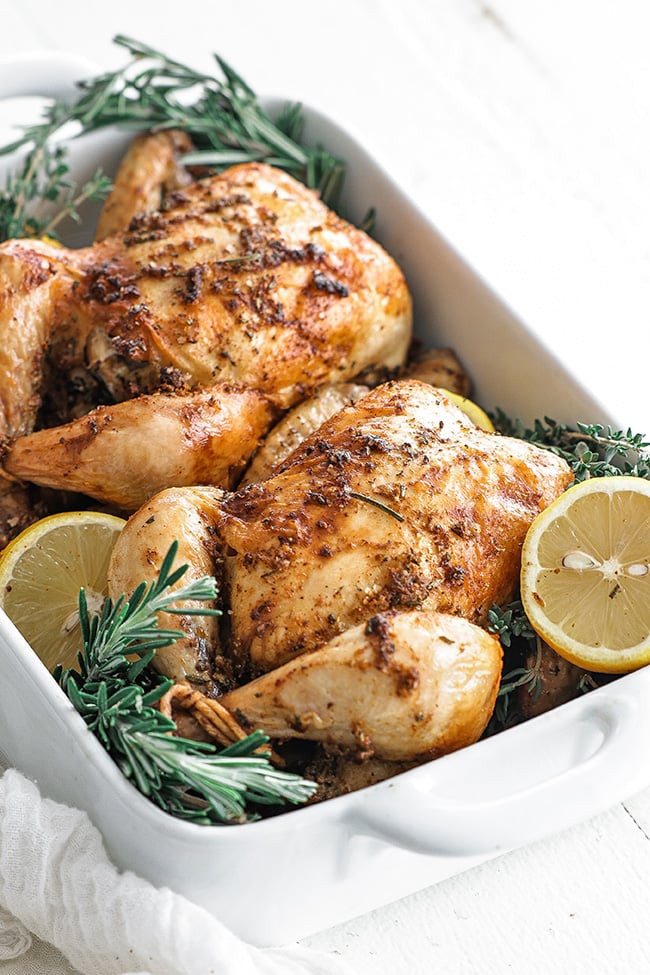 Cornish Hen vs. Chicken
Cornish Hen vs. Chicken
Caption: A close-up showcasing the golden-brown roasted Cornish hens, emphasizing their perfect size and elegant presentation, ideal for a special occasion.
3. How to Prepare Cornish Game Hen
Preparing Cornish game hens is straightforward. Here’s a step-by-step guide:
- Thawing: If frozen, thaw the hen in the refrigerator for 24-48 hours.
- Cleaning: Rinse the hen inside and out with cold water and pat dry with paper towels.
- Seasoning: Rub the hen with your choice of herbs, spices, and oil or butter.
- Trussing: Tie the legs together with kitchen twine to help the hen cook evenly.
- Roasting: Place the hen in a roasting pan and cook at the recommended temperature.
3.1. Essential Tools and Ingredients
Make sure you have these essentials on hand:
- Cornish Game Hens: Fresh or thawed frozen hens.
- Roasting Pan: A pan with a rack to elevate the hens.
- Kitchen Twine: For trussing the hens.
- Meat Thermometer: To ensure the hens are cooked to a safe internal temperature.
- Olive Oil or Butter: For basting and adding flavor.
- Herbs and Spices: Such as rosemary, thyme, garlic, salt, and pepper.
3.2. Step-by-Step Roasting Instructions
Follow these steps for perfectly roasted Cornish hens:
- Preheat Oven: Preheat your oven to 425°F (220°C).
- Prepare the Hens: Rinse and pat the hens dry.
- Season Generously: In a bowl, mix olive oil, minced garlic, rosemary, thyme, salt, pepper, and paprika. Rub the mixture all over the hens, including inside the cavity.
- Truss the Hens: Tuck the wings behind the hens and tie the legs together with kitchen twine.
- Roast: Place the hens on a roasting rack in a roasting pan. Add 1/2 cup of chicken broth or water to the bottom of the pan to keep the hens moist.
- Bake: Roast for 50-60 minutes, or until a meat thermometer inserted into the thickest part of the thigh registers 165°F (74°C).
- Rest: Remove the hens from the oven and let them rest for 10 minutes before serving.
3.3. Seasoning and Flavor Combinations
Experiment with these delicious flavor combinations:
- Garlic Herb: A classic combination of garlic, rosemary, thyme, and olive oil.
- Lemon Pepper: Lemon zest, black pepper, and a touch of garlic.
- Smoked Paprika: Smoked paprika, garlic powder, onion powder, and a pinch of cayenne pepper.
- Maple Glazed: Maple syrup, Dijon mustard, and a dash of apple cider vinegar.
- Asian Inspired: Soy sauce, ginger, garlic, and sesame oil.
4. Cooking Methods for Cornish Game Hen
Beyond roasting, explore these cooking methods:
- Grilling: Provides a smoky flavor, perfect for outdoor cooking.
- Pan-Seared: Creates a crispy skin and juicy interior.
- Braising: Tenderizes the meat in a flavorful liquid.
- Smoking: Infuses a deep, smoky flavor.
- Air Frying: A quick and healthy way to achieve crispy skin.
4.1. Grilling Cornish Game Hens
Grilling adds a smoky flavor that complements the delicate meat:
- Prepare the Grill: Preheat your grill to medium heat.
- Season the Hens: Marinate or rub the hens with your favorite seasonings.
- Grill: Place the hens on the grill, breast side up.
- Cook: Grill for 20-25 minutes, turning occasionally, until the internal temperature reaches 165°F (74°C).
- Rest: Let the hens rest for 10 minutes before serving.
4.2. Pan-Searing Cornish Game Hens
Pan-searing creates a crispy skin and juicy interior:
- Prepare the Hens: Pat the hens dry and season with salt and pepper.
- Heat the Pan: Heat olive oil in a large skillet over medium-high heat.
- Sear: Place the hens in the skillet, breast side down.
- Cook: Sear for 6-8 minutes until the skin is golden brown and crispy.
- Flip and Finish: Flip the hens and cook for another 6-8 minutes, or until the internal temperature reaches 165°F (74°C).
- Rest: Let the hens rest for 10 minutes before serving.
4.3. Braising Cornish Game Hens
Braising tenderizes the meat in a flavorful liquid:
- Sear the Hens: Sear the hens in a skillet until browned on all sides.
- Add Aromatics: Add chopped onions, carrots, and celery to the skillet and cook until softened.
- Add Liquid: Pour in chicken broth, wine, or another flavorful liquid to cover the hens partially.
- Simmer: Bring to a simmer, then cover and cook in a 325°F (160°C) oven for 1-1.5 hours, or until the hens are tender.
- Rest: Let the hens rest in the braising liquid for 10 minutes before serving.
5. Side Dishes to Serve with Cornish Game Hen
Complement your Cornish hens with these delicious side dishes:
- Roasted Vegetables: Carrots, potatoes, Brussels sprouts, and asparagus.
- Mashed Potatoes: Creamy mashed potatoes with garlic and herbs.
- Rice Pilaf: Fluffy rice pilaf with vegetables and broth.
- Quinoa Salad: A healthy and flavorful quinoa salad with herbs and vegetables.
- Green Beans Almondine: Green beans with toasted almonds and butter.
5.1. Vegetable Pairings
Consider these vegetable pairings for a balanced meal:
- Asparagus: Grilled or roasted asparagus with lemon and Parmesan cheese.
- Brussels Sprouts: Roasted Brussels sprouts with balsamic glaze.
- Carrots: Glazed carrots with maple syrup and ginger.
- Sweet Potatoes: Roasted sweet potatoes with cinnamon and pecans.
- Green Beans: Sautéed green beans with garlic and olive oil.
5.2. Starch and Grain Options
Enhance your meal with these starch and grain options:
- Mashed Potatoes: Creamy mashed potatoes with garlic and herbs.
- Rice Pilaf: Fluffy rice pilaf with vegetables and broth.
- Quinoa Salad: A healthy and flavorful quinoa salad with herbs and vegetables.
- Polenta: Creamy polenta with Parmesan cheese and herbs.
- Couscous: Light and fluffy couscous with dried fruits and nuts.
5.3. Sauce and Gravy Suggestions
Elevate the flavor with these sauce and gravy suggestions:
- Pan Gravy: A classic gravy made from the pan drippings of the roasted hens.
- Mushroom Sauce: A rich and earthy mushroom sauce with cream and herbs.
- Lemon Butter Sauce: A bright and tangy lemon butter sauce.
- Cranberry Sauce: A sweet and tart cranberry sauce, perfect for holiday meals.
- Dijon Mustard Sauce: A creamy Dijon mustard sauce with white wine and herbs.
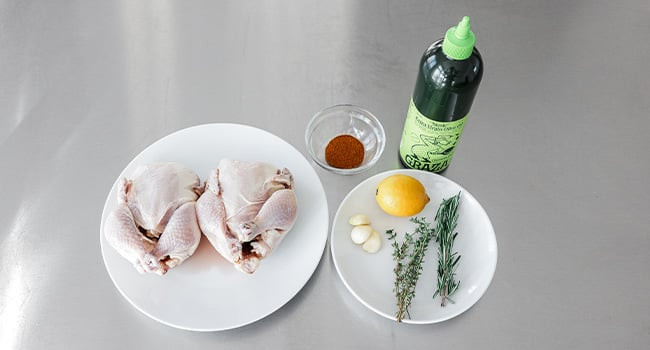 Cornish Hen Ingredients
Cornish Hen Ingredients
Caption: A vibrant display of fresh Cornish hen ingredients, including herbs, spices, and olive oil, ready to create a flavorful dish.
6. Tips for the Perfect Cornish Game Hen
Achieving the perfect Cornish game hen requires attention to detail:
- Thaw Properly: Ensure the hen is fully thawed before cooking for even cooking.
- Pat Dry: Patting the hen dry helps the skin crisp up during cooking.
- Season Generously: Don’t be afraid to season the hen inside and out for maximum flavor.
- Use a Meat Thermometer: Ensure the hen is cooked to a safe internal temperature of 165°F (74°C).
- Let it Rest: Resting the hen allows the juices to redistribute, resulting in a more tender and flavorful bird.
6.1. Avoiding Common Mistakes
Avoid these common pitfalls:
- Overcooking: Overcooking can result in dry, tough meat.
- Under seasoning: Under seasoning can lead to a bland flavor.
- Not Thawing Properly: Cooking a partially frozen hen can result in uneven cooking.
- Skipping the Resting Period: Cutting into the hen immediately after cooking can cause the juices to run out, resulting in drier meat.
- Using the Wrong Temperature: Cooking at the wrong temperature can lead to uneven cooking or burning.
6.2. Ensuring Even Cooking
Ensure even cooking with these tips:
- Truss the Hen: Trussing helps the hen cook evenly by maintaining a compact shape.
- Use a Roasting Rack: Elevating the hen on a roasting rack allows for even air circulation.
- Rotate the Pan: Rotate the roasting pan halfway through cooking to ensure even browning.
- Check Internal Temperature: Use a meat thermometer to check the internal temperature in multiple spots to ensure it reaches 165°F (74°C) throughout.
- Don’t Overcrowd the Pan: If cooking multiple hens, make sure they are not overcrowded in the pan to allow for even cooking.
6.3. Achieving Crispy Skin
Achieve crispy skin with these techniques:
- Pat the Hen Dry: Thoroughly patting the hen dry removes excess moisture that can prevent the skin from crisping up.
- Use High Heat: Cooking at a higher temperature for the first part of the cooking process can help render the fat and crisp the skin.
- Baste with Fat: Basting the hen with olive oil or melted butter can help the skin crisp up and brown evenly.
- Don’t Cover the Hen: Covering the hen during cooking can trap moisture and prevent the skin from crisping up.
- Broil Briefly: Broiling the hen for a few minutes at the end of cooking can help crisp up the skin, but watch carefully to prevent burning.
7. Storing and Reheating Cornish Game Hen
Proper storage and reheating are essential for maintaining flavor and safety:
- Storing: Store leftover Cornish hen in an airtight container in the refrigerator for up to 3-4 days.
- Freezing: Freeze cooked Cornish hen for up to 2-3 months. Wrap tightly in plastic wrap and then in a freezer bag to prevent freezer burn.
- Reheating: Reheat in the oven, microwave, or skillet.
7.1. Safe Storage Practices
Follow these safe storage practices:
- Cool Quickly: Cool leftover Cornish hen quickly before refrigerating to prevent bacterial growth.
- Use Airtight Containers: Store in airtight containers to prevent contamination and maintain moisture.
- Label and Date: Label containers with the date to keep track of storage time.
- Don’t Leave at Room Temperature: Don’t leave cooked Cornish hen at room temperature for more than 2 hours.
- Check for Spoilage: Before reheating, check for any signs of spoilage, such as a foul odor or slimy texture.
7.2. Reheating Methods
Choose the best reheating method for your needs:
- Oven: Reheat in a preheated oven at 350°F (175°C) for 15-20 minutes, or until heated through.
- Microwave: Reheat in the microwave on medium power for 2-3 minutes, or until heated through.
- Skillet: Reheat in a skillet over medium heat with a little oil or butter, turning occasionally, until heated through.
- Air Fryer: Reheat in the air fryer at 350°F (175°C) for 5-7 minutes, or until heated through.
- Steaming: Reheat by steaming over a pot of boiling water until heated through, which helps retain moisture.
7.3. Maintaining Flavor and Moisture During Reheating
Maintain flavor and moisture with these tips:
- Add Moisture: Add a little broth, water, or sauce to the Cornish hen before reheating to prevent it from drying out.
- Cover During Reheating: Cover the Cornish hen during reheating to trap moisture and prevent it from drying out.
- Use Low Heat: Reheat at a lower temperature to prevent the Cornish hen from becoming tough or overcooked.
- Baste During Reheating: Baste the Cornish hen with pan juices, melted butter, or sauce during reheating to add flavor and moisture.
- Don’t Overheat: Avoid overheating the Cornish hen, as this can cause it to become dry and tough.
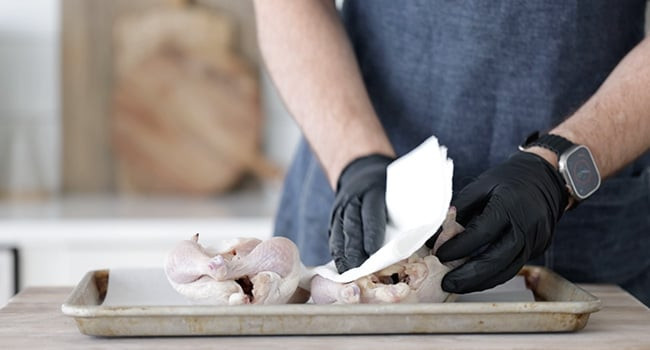 Patting Dry Cornish Hens
Patting Dry Cornish Hens
Caption: An image displaying the process of patting dry Cornish hens with paper towels to ensure crispy skin during cooking.
8. Cornish Game Hen Recipes to Try
Explore these delicious Cornish game hen recipes:
- Roasted Cornish Game Hen with Herbs: A classic recipe with rosemary, thyme, and garlic.
- Lemon Butter Cornish Game Hen: A bright and tangy recipe with lemon and butter.
- Smoked Paprika Cornish Game Hen: A smoky and flavorful recipe with smoked paprika and spices.
- Maple Glazed Cornish Game Hen: A sweet and savory recipe with maple syrup and Dijon mustard.
- Asian Inspired Cornish Game Hen: An exotic recipe with soy sauce, ginger, and sesame oil.
8.1. Classic Roasted Cornish Game Hen
Ingredients:
- 2 Cornish game hens
- 2 tablespoons olive oil
- 2 cloves garlic, minced
- 2 sprigs rosemary, chopped
- 2 sprigs thyme, chopped
- Salt and pepper to taste
Instructions:
- Preheat oven to 425°F (220°C).
- Rinse and pat dry the Cornish game hens.
- In a bowl, mix olive oil, garlic, rosemary, thyme, salt, and pepper.
- Rub the mixture all over the hens, including inside the cavity.
- Place the hens on a roasting rack in a roasting pan.
- Roast for 50-60 minutes, or until a meat thermometer inserted into the thickest part of the thigh registers 165°F (74°C).
- Let the hens rest for 10 minutes before serving.
8.2. Lemon Butter Cornish Game Hen
Ingredients:
- 2 Cornish game hens
- 4 tablespoons butter, melted
- 2 tablespoons lemon juice
- 1 clove garlic, minced
- 1 teaspoon lemon zest
- Salt and pepper to taste
Instructions:
- Preheat oven to 425°F (220°C).
- Rinse and pat dry the Cornish game hens.
- In a bowl, mix melted butter, lemon juice, garlic, lemon zest, salt, and pepper.
- Brush the mixture all over the hens, including inside the cavity.
- Place the hens on a roasting rack in a roasting pan.
- Roast for 50-60 minutes, or until a meat thermometer inserted into the thickest part of the thigh registers 165°F (74°C).
- Let the hens rest for 10 minutes before serving.
8.3. Smoked Paprika Cornish Game Hen
Ingredients:
- 2 Cornish game hens
- 2 tablespoons olive oil
- 1 tablespoon smoked paprika
- 1 teaspoon garlic powder
- 1 teaspoon onion powder
- 1/2 teaspoon cayenne pepper
- Salt and pepper to taste
Instructions:
- Preheat oven to 425°F (220°C).
- Rinse and pat dry the Cornish game hens.
- In a bowl, mix olive oil, smoked paprika, garlic powder, onion powder, cayenne pepper, salt, and pepper.
- Rub the mixture all over the hens, including inside the cavity.
- Place the hens on a roasting rack in a roasting pan.
- Roast for 50-60 minutes, or until a meat thermometer inserted into the thickest part of the thigh registers 165°F (74°C).
- Let the hens rest for 10 minutes before serving.
9. Troubleshooting Common Issues
Even experienced cooks can encounter issues:
- Dry Meat: Caused by overcooking; use a meat thermometer and don’t overcook.
- Uneven Cooking: Ensure the oven temperature is accurate and the hen is properly thawed.
- Bland Flavor: Season generously and consider brining the hen before cooking.
- Skin Not Crispy: Pat the hen dry and use high heat for the first part of cooking.
- Burning: Reduce oven temperature and cover the hen loosely with foil if it starts to burn.
9.1. Addressing Dry Meat
Combat dry meat with these solutions:
- Use a Meat Thermometer: Monitor the internal temperature closely to avoid overcooking.
- Brine the Hen: Brining helps the meat retain moisture during cooking.
- Baste Regularly: Basting with pan juices or melted butter adds moisture and flavor.
- Cook at a Lower Temperature: Cooking at a lower temperature can help prevent the meat from drying out.
- Let it Rest: Resting allows the juices to redistribute, resulting in more tender and moist meat.
9.2. Fixing Uneven Cooking
Ensure even cooking with these adjustments:
- Check Oven Temperature: Use an oven thermometer to ensure your oven is heating accurately.
- Thaw Properly: Make sure the Cornish hen is fully thawed before cooking.
- Use a Roasting Rack: Elevating the hen on a roasting rack allows for even air circulation.
- Rotate the Pan: Rotate the roasting pan halfway through cooking to ensure even browning.
- Don’t Overcrowd the Pan: If cooking multiple hens, make sure they are not overcrowded in the pan to allow for even cooking.
9.3. Enhancing Flavor
Boost the flavor with these tips:
- Season Generously: Don’t be afraid to season the hen inside and out with salt, pepper, herbs, and spices.
- Marinate: Marinating the hen before cooking can add flavor and moisture.
- Use Fresh Herbs: Fresh herbs add a brighter, more vibrant flavor than dried herbs.
- Add Aromatics: Adding aromatics such as garlic, onions, and celery to the roasting pan can infuse the hen with flavor.
- Baste with Flavorful Liquids: Basting with pan juices, wine, broth, or melted butter can add flavor and moisture.
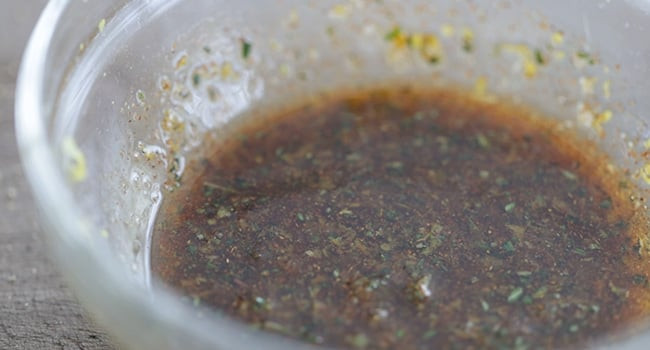 Oil and Herbs in a Bowl
Oil and Herbs in a Bowl
Caption: A bowl filled with a mix of olive oil and aromatic herbs, essential for creating a flavorful rub for Cornish hens.
10. Health and Safety Considerations
Prioritize health and safety when handling and cooking poultry:
- Wash Hands: Wash hands thoroughly before and after handling raw poultry.
- Use Separate Cutting Boards: Use separate cutting boards for raw poultry and other foods to prevent cross-contamination.
- Cook to Safe Temperature: Cook Cornish hens to an internal temperature of 165°F (74°C).
- Refrigerate Promptly: Refrigerate leftovers promptly to prevent bacterial growth.
- Avoid Cross-Contamination: Avoid cross-contamination by keeping raw poultry separate from other foods in the refrigerator.
10.1. Safe Handling of Raw Poultry
Follow these guidelines for handling raw poultry:
- Wash Hands: Wash hands thoroughly with soap and water before and after handling raw poultry.
- Use Separate Cutting Boards: Use separate cutting boards for raw poultry and other foods to prevent cross-contamination.
- Clean and Sanitize: Clean and sanitize cutting boards, knives, and countertops after contact with raw poultry.
- Avoid Cross-Contamination: Avoid cross-contamination by keeping raw poultry separate from other foods in the refrigerator.
- Thaw Properly: Thaw Cornish hens in the refrigerator or in a sealed bag in cold water, changing the water every 30 minutes.
10.2. Ensuring Proper Cooking Temperatures
Ensure proper cooking temperatures with these tips:
- Use a Meat Thermometer: Use a meat thermometer to check the internal temperature of the Cornish hen in the thickest part of the thigh, away from the bone.
- Cook to 165°F (74°C): Cook the Cornish hen to an internal temperature of 165°F (74°C) to kill harmful bacteria.
- Check in Multiple Spots: Check the internal temperature in multiple spots to ensure it reaches 165°F (74°C) throughout.
- Don’t Rely on Visual Cues: Don’t rely on visual cues such as color or texture to determine doneness, as these can be unreliable.
- Let it Rest: After cooking, let the Cornish hen rest for 10 minutes before carving to allow the juices to redistribute and ensure it is fully cooked.
10.3. Preventing Foodborne Illness
Prevent foodborne illness with these precautions:
- Cook Thoroughly: Cook Cornish hens thoroughly to kill harmful bacteria.
- Refrigerate Promptly: Refrigerate leftovers promptly to prevent bacterial growth.
- Avoid Cross-Contamination: Avoid cross-contamination by keeping raw poultry separate from other foods in the refrigerator.
- Wash Hands: Wash hands thoroughly with soap and water before and after handling raw poultry.
- When in Doubt, Throw it Out: If you are unsure whether a Cornish hen is safe to eat, throw it out.
FAQ: Answering Your Questions About Cornish Game Hens
Still have questions? Here are some frequently asked questions about Cornish game hens:
-
What is the difference between a Cornish hen and a chicken?
A Cornish hen is a smaller, younger bird, typically weighing between 1 and 2 pounds, while chickens vary in size and age.
-
How do I thaw a Cornish hen?
Thaw it in the refrigerator for 24-48 hours or in a sealed bag in cold water, changing the water every 30 minutes.
-
What is the ideal internal temperature for a cooked Cornish hen?
The ideal internal temperature is 165°F (74°C) in the thickest part of the thigh.
-
How do I get crispy skin on a Cornish hen?
Pat the hen dry, use high heat for the first part of cooking, and baste with fat.
-
Can I grill a Cornish hen?
Yes, grilling adds a smoky flavor; cook on medium heat, turning occasionally, until done.
-
What are some good side dishes to serve with Cornish hen?
Roasted vegetables, mashed potatoes, rice pilaf, and quinoa salad are excellent choices.
-
How long can I store cooked Cornish hen in the refrigerator?
Store cooked Cornish hen in an airtight container in the refrigerator for up to 3-4 days.
-
Can I freeze cooked Cornish hen?
Yes, freeze cooked Cornish hen for up to 2-3 months, wrapped tightly in plastic wrap and then in a freezer bag.
-
What is the best way to reheat Cornish hen?
Reheat in the oven, microwave, skillet, or air fryer, adding moisture to prevent drying out.
-
What if my Cornish hen is dry after cooking?
Baste regularly, brine the hen before cooking, and ensure you’re not overcooking it.
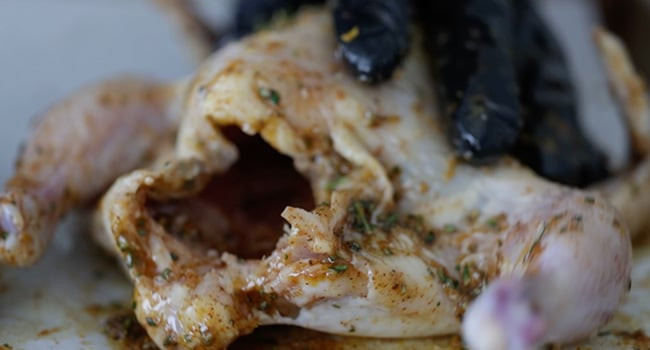 Coating Hens in a Rub
Coating Hens in a Rub
Caption: An image showcasing the process of coating Cornish hens with a flavorful herb rub, ensuring a delicious and aromatic dish.
Conclusion
Cornish game hens are a delightful and versatile option for any meal, from special occasions to simple weeknight dinners. With their perfect portion size, elegant presentation, and delicious flavor, they are sure to impress. Whether you choose to roast, grill, pan-sear, or braise them, the possibilities are endless.
If you encounter any issues with your Polar fitness tracker while preparing your culinary masterpiece, remember that polarservicecenter.net is here to help. We offer comprehensive guides, troubleshooting tips, and expert support to ensure your Polar device performs optimally.
Ready to Cook with Confidence?
Visit polarservicecenter.net today for more information and support. Contact us at +1 (303) 492-7080 or visit our location at 2902 Bluff St, Boulder, CO 80301, United States. Let us help you make the most of your Polar products and enjoy every moment in the kitchen. Explore our website for detailed instructions, warranty information, and contact our customer support team to ensure your product performs at its best. Discover how to optimize your Polar experience, ensuring seamless functionality and peace of mind.
